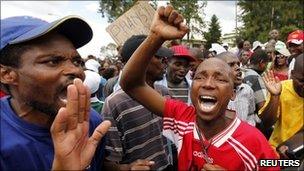Swaziland: Protest at pay freeze while king celebrates
- Published

Some of the protesters said they were inspired by the uprisings in North Africa
Civil servants have held the biggest march in Swaziland for several years, to protest at a pay freeze and demand that the government resigns.
Several thousand people marched through the capital Mbabane amid fears that the state will not be able to pay public salaries.
Some blamed government corruption and plans for lavish celebrations for the anniversary of the king's coronation.
Swaziland is Africa's last absolute monarchy. Political parties are banned.
Under heavy police presence, teachers, nurses and students carried posters with slogans such as "Why cut salaries, cut corrupt government" and "Down with celebrations".
Swaziland recently suffered a 60% drop in income from the Southern African Customs Union, which accounts for two-thirds of state revenues.
The International Monetary Fund says the government must reduce public spending before it can apply for any further loans.
The scale of the march was a sign of growing discontent with King Mswati's austerity rule, analysts say.
Pro-democracy protests last year attracted only a few hundred people and were broken up by police.
"Swaziland cannot remain an island of dictatorship in the sea of democracy," Mario Masuku head of the banned opposition People's United Democratic Movement (Pudemo) told the crowd, reports the AP news agency.
"Royalty has squandered the economy... We want a government by the people," he said.
Some protesters said they were inspired by the recent uprisings in North Africa and the Middle East.
They handed over a petition to Prime Minister Sibusiso Dlamini, demanding that he and the cabinet resign.
King Mswati III - who has 14 wives - has been accused of living a lavish lifestyle, while hundreds of thousands live in poverty.
Swaziland has a population of only 1.4 million but 40% of them are unemployed, and 70% of the population is living on less than $1 (75p) a day.
- Published10 September 2010
- Published20 August 2010